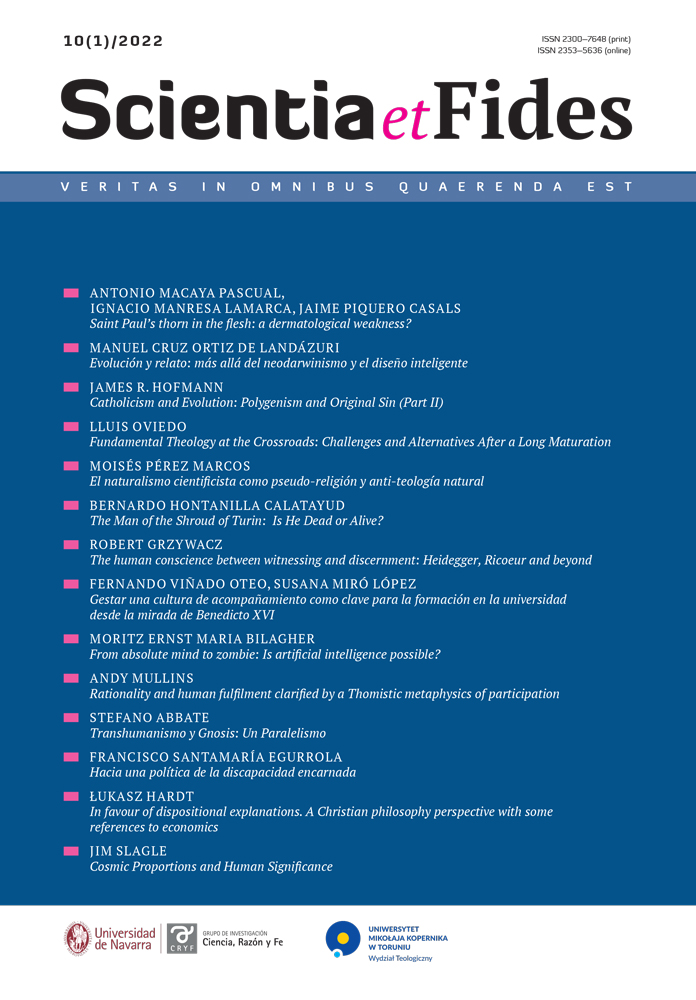Evolución y relato: más allá del neodarwinismo y el diseño inteligente
DOI:
https://doi.org/10.12775/SetF.2022.002Keywords
Dawkins, Intelligent Design, Neo-Darwinism, Synthetic theory of evolution, verisimilitudeAbstract
Evolution and Story: Beyond Neo-Darwinism and Intelligent Design
This article analyses evolution from a philosophical perspective, contrasting the problems raised by both Neo-Darwinism and Intelligent Design theory. First, I discuss some of the problems that Synthetic theory presents from a scientific point of view, as well as the philosophical problems involved in the Neo-Darwinism of Dawkins, Dennett, Monod and Ruse. I argue that Neo-Darwinism, although presented as a scientific doctrine, is in fact fundamentally philosophical, and presents some important problems that make it difficult to believe. On the other hand, I discuss the scope of intelligent design as a philosophical stance on the evolution of living beings, showing its problems. Finally, I propose a credible philosophical account of evolution that seeks to go beyond a scientific reading of the data of experience
References
Alexander, Denis R. 2020. “Is Evolution a Chance Process?”. Scientia et Fides 8: 15-41.
Artigas, Mariano. 1992. La inteligibilidad de la naturaleza. Pamplona: Eunsa.
Ayala, Francisco José. 2007. Darwin y el diseño inteligente. Madrid: Alianza.
Behe, Michael. 1999. La caja negra de Darwin. Barcelona: Andrés Bello.
Cairns, J., Overbaugh, J., Miller, S. 1988. “The origin of mutants”. Nature 335: 142-145.
Collado, Santiago. 2008. “Panorámica del «diseño inteligente»”. Acta Philosophica 17: 38.
Dawkins, Richard. 1988. El relojero ciego. Barcelona: Labor.
Dembski, William. 2006. Diseño inteligente. Madrid: Homo Legens.
Dennett, Daniel. 1999. La peligrosa idea de Darwin, Barcelona: Galaxia Gutenberg.
Dobzhansky, Theodosius. 1973. “Nothing in Biology Makes Sense Except in the Light of Evolution”. The American Biology Teacher: 125-129.
Gilson, Etienne. 1976. De Aristóteles a Darwin (y vuelta). Pamplona: Eunsa.
Godfrey-Smith, Peter. 2001. “Information and the Argument from Design”. In Intelligent Design and Its Critics, edited by R. T. Pennock, 575-596. Cambridge: MIT Press.
Gould, Stephen. 1977. Ontogeny and Phylogeny. Cambridge: Harvard University Press.
Gould, Stephen. 1985. El pulgar del panda. Barcelona: Orbis.
Jablonka, Eva y Lamb, Marion. 2005. Evolution in Four Dimensions, Cambridge: MIT Press, Cambridge.
Kitcher, Philip. 2001. “Born-Again Creationism”, In Intelligent Design and Its Critics, edited by R. T. Pennock, 257-287. Cambridge: MIT Press.
Koonin, Eugene V. 2019. “Lamarckian or not, CRISPR-Cas is an elaborate engine of directed evolution”. Biology and Philosophy 34, 17. doi: 10.1007/s10539-018-9666-7
Laublicher, Manfred, y Maienschein, Jane (eds.). 2009. Form and Function in Developmental Evolution. Cambridge: Cambridge University Press.
Mayr, Ernst. 1988. “The Multiple Meanings of Teleological”, in Toward a New Philosophy of Biology. Cambridge: Harvard University Press, 38-66.
Monod, Jacques. 1985. El azar y la necesidad. Barcelona: Orbis.
Platón. Timeo. Traducción de C. Eggers. 2005. Buenos Aires: Colihue.
Popper, Karl. 1983. Conjeturas y refutaciones. Barcelona: Paidos.
Ruse, Michael. 2003. Darwin and Design. Cambridge: Harvard University Press.
Whitfield, John. 2008. “Postmodern Evolution?”. Nature 455: 281-284.
Downloads
Published
How to Cite
Issue
Section
License
Copyright (c) 2022 Scientia et Fides

This work is licensed under a Creative Commons Attribution-NoDerivatives 4.0 International License.
CC BY ND 4.0. The Creator/Contributor is the Licensor, who grants the Licensee a non-exclusive license to use the Work on the fields indicated in the License Agreement.
- The Licensor grants the Licensee a non-exclusive license to use the Work/related rights item specified in § 1 within the following fields: a) recording of Work/related rights item; b) reproduction (multiplication) of Work/related rights item in print and digital technology (e-book, audiobook); c) placing the copies of the multiplied Work/related rights item on the market; d) entering the Work/related rights item to computer memory; e) distribution of the work in electronic version in the open access form on the basis of Creative Commons license (CC BY-ND 3.0) via the digital platform of the Nicolaus Copernicus University Press and file repository of the Nicolaus Copernicus University.
- Usage of the recorded Work by the Licensee within the above fields is not restricted by time, numbers or territory.
- The Licensor grants the license for the Work/related rights item to the Licensee free of charge and for an unspecified period of time.
FULL TEXT License Agreement
Stats
Number of views and downloads: 2760
Number of citations: 0



